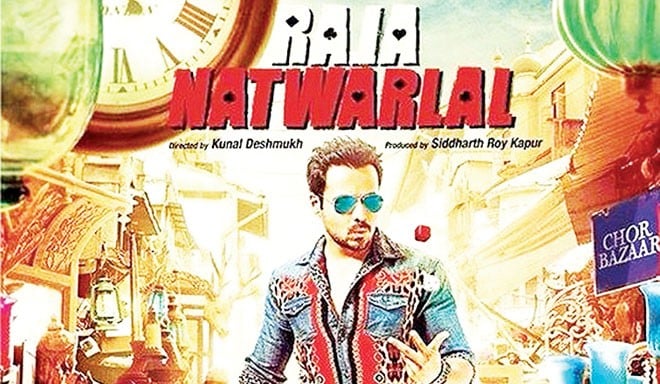
Humaima's Bollywood debut film doesn't have quite enough sting; The Longest Week is slight but quietly enjoyable.

Raja Natwarlal ** 1/2
Dir: Kunal Deshmukh
Starring: Emraan Hashmi, Humaima Malick, Paresh Rawal, Kay Kay Menon, Deepak Tijori
Director Kunal Deshmukh and leading man Emraan Hashmi team up for the fourth time for what is probably their most successful joint effort, creatively speaking. Lifting its basic plot structure from the Paul Newman/Robert Redford starrer, the Oscar-winning The Sting and some elements from some other con/caper movies, Deshmukh and his writers Parveez Sheikh and Sanjay Masoom keep the wheels spinning and the plot twists coming during the movie’s 2 hours and 20 minutes. Since the curves that are thrown the audience’s way are fairly interesting and unpredictable, I was never really bored during the film’s duration as con-man Raja (Emraan Hashmi) and his cohorts, led by Yogi (Paresh Rawal), aim to pull off an elaborate scam against the corrupt billionaire, Varda Yadav (Kay Kay Menon). The movie also features one of Emraan Hashmi’s better performances and decent supporting turns from the likes of the ever-reliable Rawal, and Menon and an understated Deepak Tijori. Sumeet Nijhawan also makes his presence felt as a cop with an agenda of his own. One performance may not be enough evidence but Nijhawan certainly appears to hold enough potential to be another Yashpal Sharma (one of the best supporting actors currently working in Mollywood and one who doesn’t quite get the recognition he deserves).
The movie’s plot, however, does stretch credibility to breaking point and Yadav is too easily sucked in by Raja and company. Movies like this also need to build the tension up to a fever pitch and Raja Natwarlal never quite manages to raise the nail-biting to that kind of level. The movie’s pacing also suffers because of the unnecessary songs that are thrown in. Natwarlal is one of those movies which was probably better off without any songs at all. Worse, while the music (usually a Hashmi starrer’s strong point) by Yuvan Shankar Raja is not actively bad it isn’t particularly memorable either. Disappointingly, our own Humaima Malik doesn’t really get a chance to show off her acting prowess (which is more of her forte) and is reduced basically to a few dance numbers and a couple of smooching scenes (practically a prerequisite in any Hashmi starrer). She deserved a better launching showcase for her talents in Mollywood.
Cut to chase: Keeps you involved but could have done with a bit more sting
The Longest Week
** 1/2
Dir: Peter Glanz
Starring: Jason Bateman, Olivia Wilde, Billy Crudup, Jenny Slate
Peter Glanz’ short film, A Relation In Four Days, which made a bit of an impact at the Sundance Film Festival a few years ago, serves as the basis for the writer/director’s first full length feature. Conrad Valmont (Jason Bateman) has a case of arrested development – he’s the sole heir to a huge family fortune and has never worked a day in his life, despite being nearly 40. He pretends to be working on his second novel (his first was neither finished nor published) but he hasn’t even started on it. It’s merely an excuse for dinner party conversation and a lure for impressionable young girls. But Conrad’s hedonistic idyll is rudely interrupted when he is disinherited by his parents and evicted from the family-owned hotel where he has always lived. He only has his one friend, Dylan (Billy Crudup), a successful artist, to turn to. Further complications arise when both Conrad and Dylan fall for the same girl, Beatrice (Olivia Wilde), a Jane Austen-loving model who aims to live a virtuous life.This is a slight but quietly enjoyable film, buoyed by the charms of its cast and some witty, self-referential banter. The characters aren’t particularly likeable but Bateman, Crudup and Wilde make them relatable. Their character arcs aren’t so revelatory or insightful either but the movie has an amusing self-awareness about this as we see in a scene near the end where Conrad’s comments on the qualities and worth of his book in response to a journalist’s question is rather obviously Glanz’ anticipatory response to any possible criticism of his work.
Glanz’ cinematic influences are obvious too: Wes Anderson’s visual style and preference for dead-pan voice-over narration as well as Woody Allen’s penchant for urbane (Manhattan-based), witty, often pretentious characters too caught up in their own narcissism and neuroses. Unfortunately, however, Glanz’ film doesn’t carry the same depth of originality, irony, satire, characterisation or bite that the best works of Anderson or Allen do. Still, there are worse ways to spend a slow afternoon than watching this movie.
Cut to chase: Slight but amusing and witty.